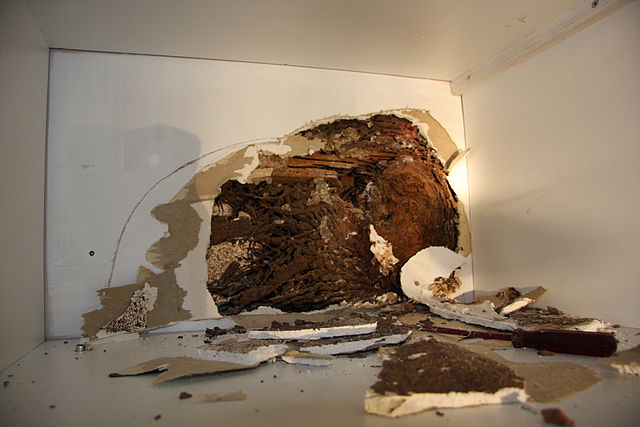
We’ve all seen the end result: from minor repairs to homes with wood so torn up and frazzled they need to be knocked down altogether.
That’s why termites—not fires, floods, hurricanes or tornadoes—are considered the greatest threat to homes.
As property owners, they can cost you anywhere from hundreds to millions of dollars. And for that, you need to be super vigilant in your effort to prevent damage. Here are some things to know, as property owners, about termite infestations:
Termites eat more than just wood
Even if your home or building is brick, you can still be at risk for termites.
See, it isn’t
wood
that termites feast on, it’s cellulose. It’s a compound within the wood. Termites have an assortment of bacteria and fungi that break down the cellulose and turn it into nutrients.
That said, cellulose can be found in other building materials like drywall, foam, plastic and even thin sheets of lead.
How to spot termite damage
Termite damage, on a large scale, is not inflicted over night – often, they can be in your home for years without your being able to detect them (large colonies typically take around five years to form).
- Some of the simple ways to spot an infestation are:
- Warped or rotted wood near doorways, flooring, shelves and cabinets
- Mud tunnels in crawlspaces and around the slab of the home/building
- Floors that bubble up or sag (like laminate floors)
- Tiny holes around wooden structures in your home/building
- Insect wings on the ground and window sills (people often mistake termites for flying ants)
How to prevent termite damage before it gets bad
As they say, the best way to tackle a problem is to start with the source. With termites, they survive on wood and moisture. So, your main options for preventing major damage are to:
- Keep food sources (wood debris, mulch, firewood and sawdust) away from the building
- Handle moisture problems (leaky roofs, gutters, faucets etc)
- Cover most, if not all, of your crawlspace soil with plastic sheeting
- Seal potential entryways, like cracks in your foundation
- Reduce humidity as much as possible, including tight spaces like attic and basement
When to call an exterminator
Any damage is a sure sign to call an exterminator. That said, we still recommend having your home inspected regularly. Most property owners opt for termite inspections once per year. Even if infestations have already set in, your exterminator can remove them before any major damage is caused to the structure.
We can help as well
We want your property to remain healthy. That’s why we could help in areas such as keeping tabs on pest infestations. It’s one of the many things we offer for property owners.
If you have any questions about termite infestations, please let us know how we can help.
Property Owners, You Need to Know These Things About Termites
Zenith Properties - Property Managers in Vancouver WA

